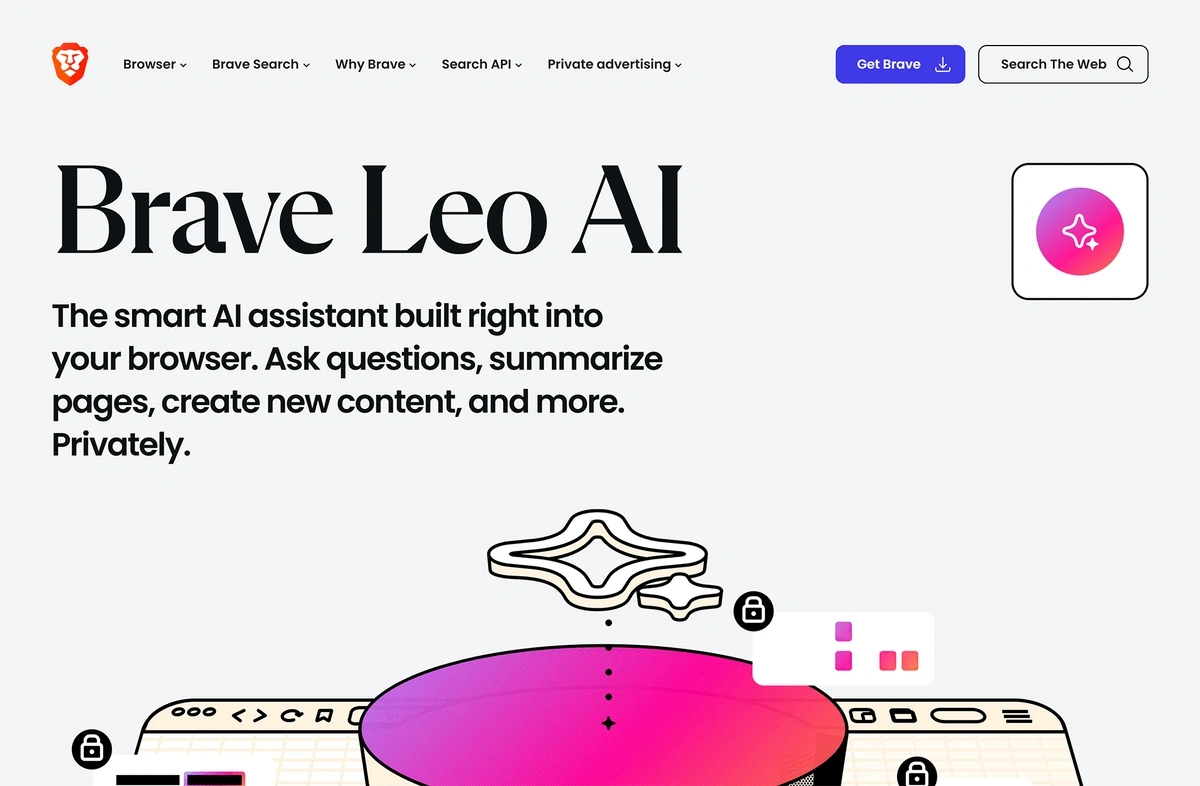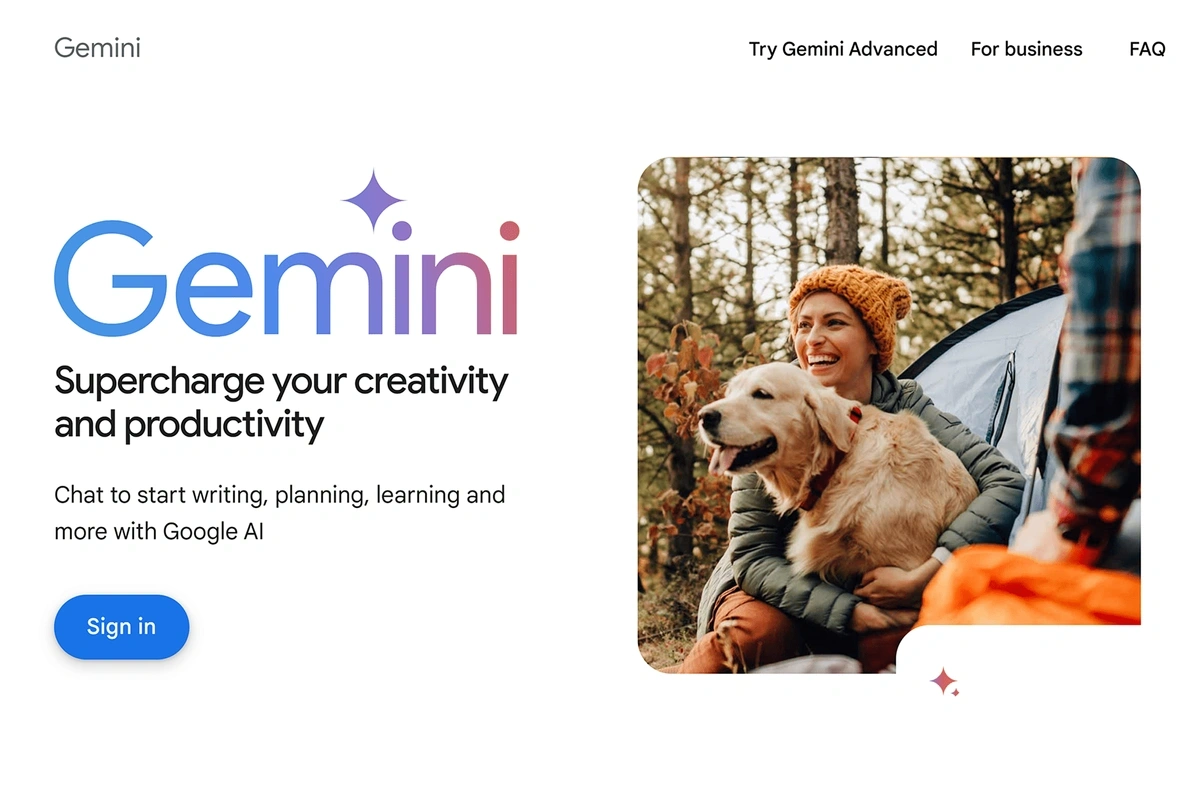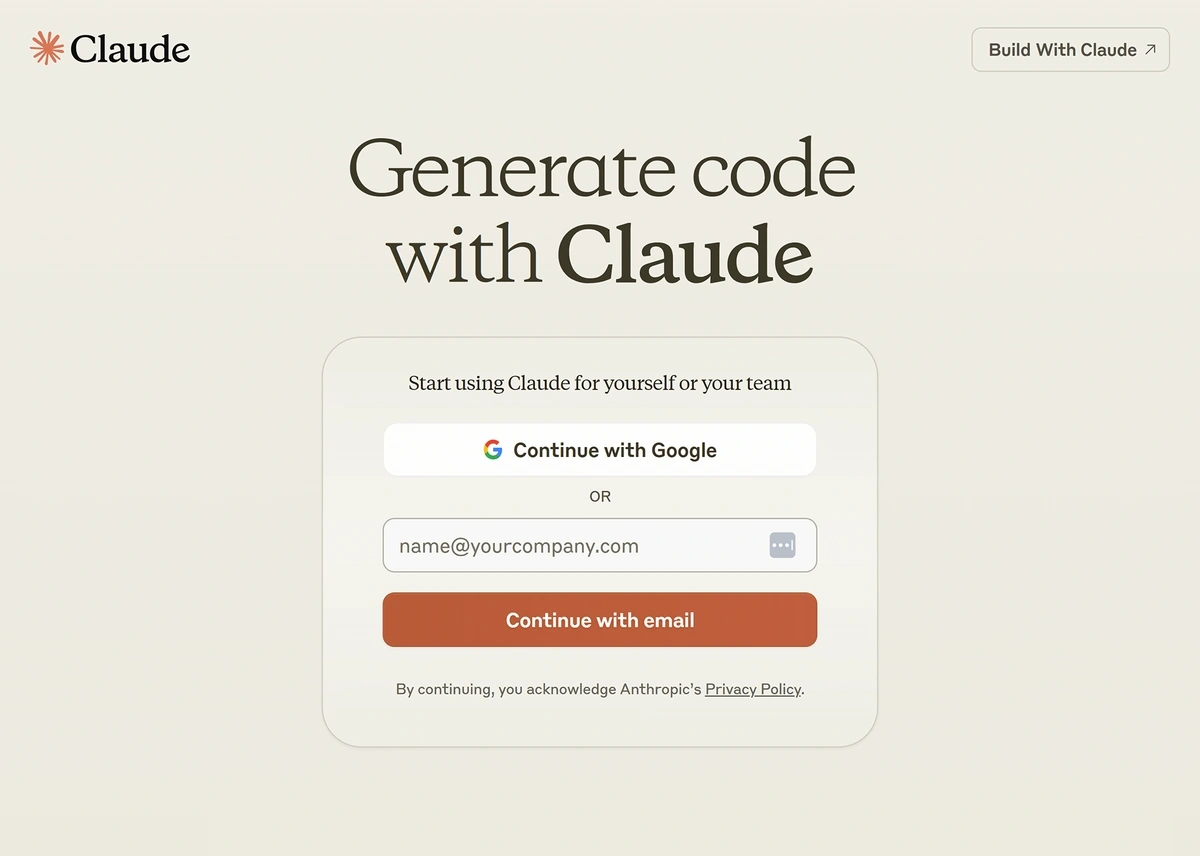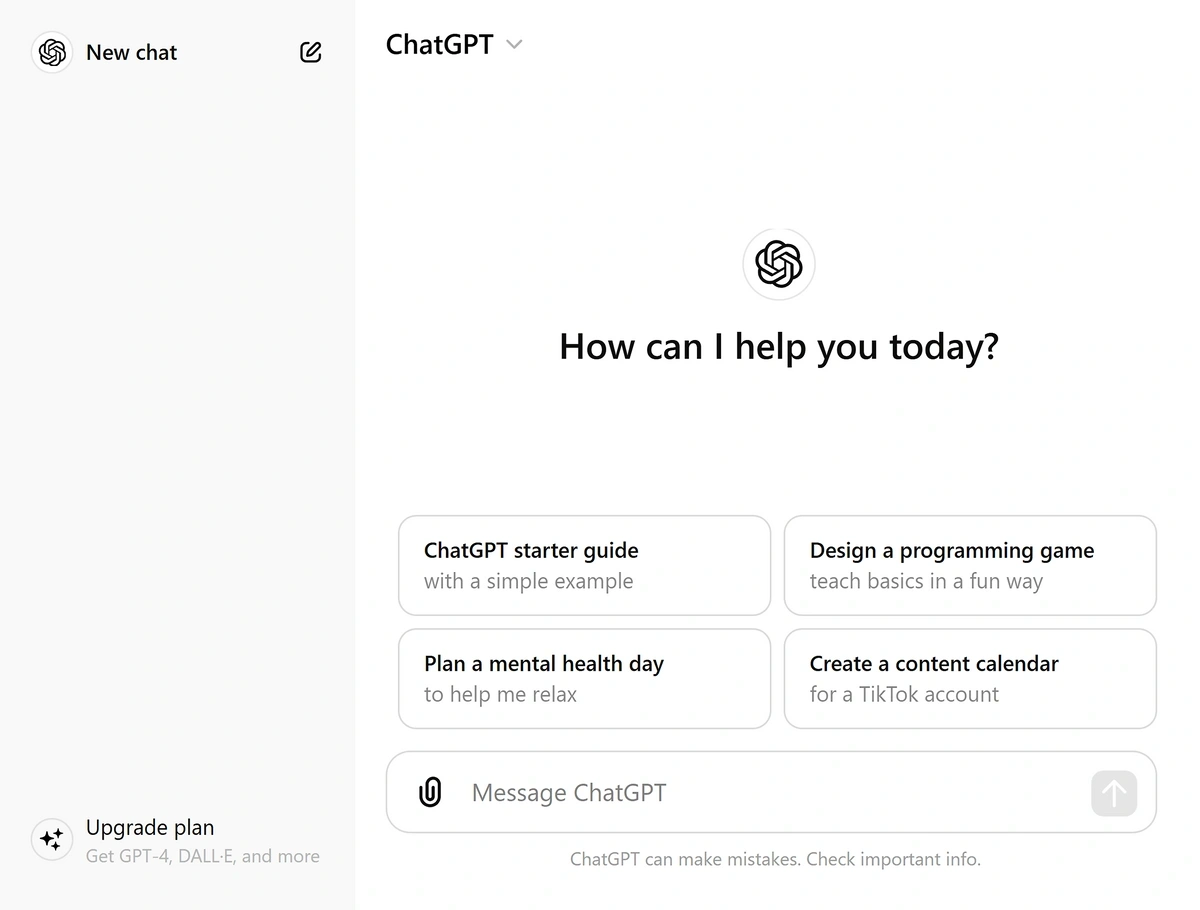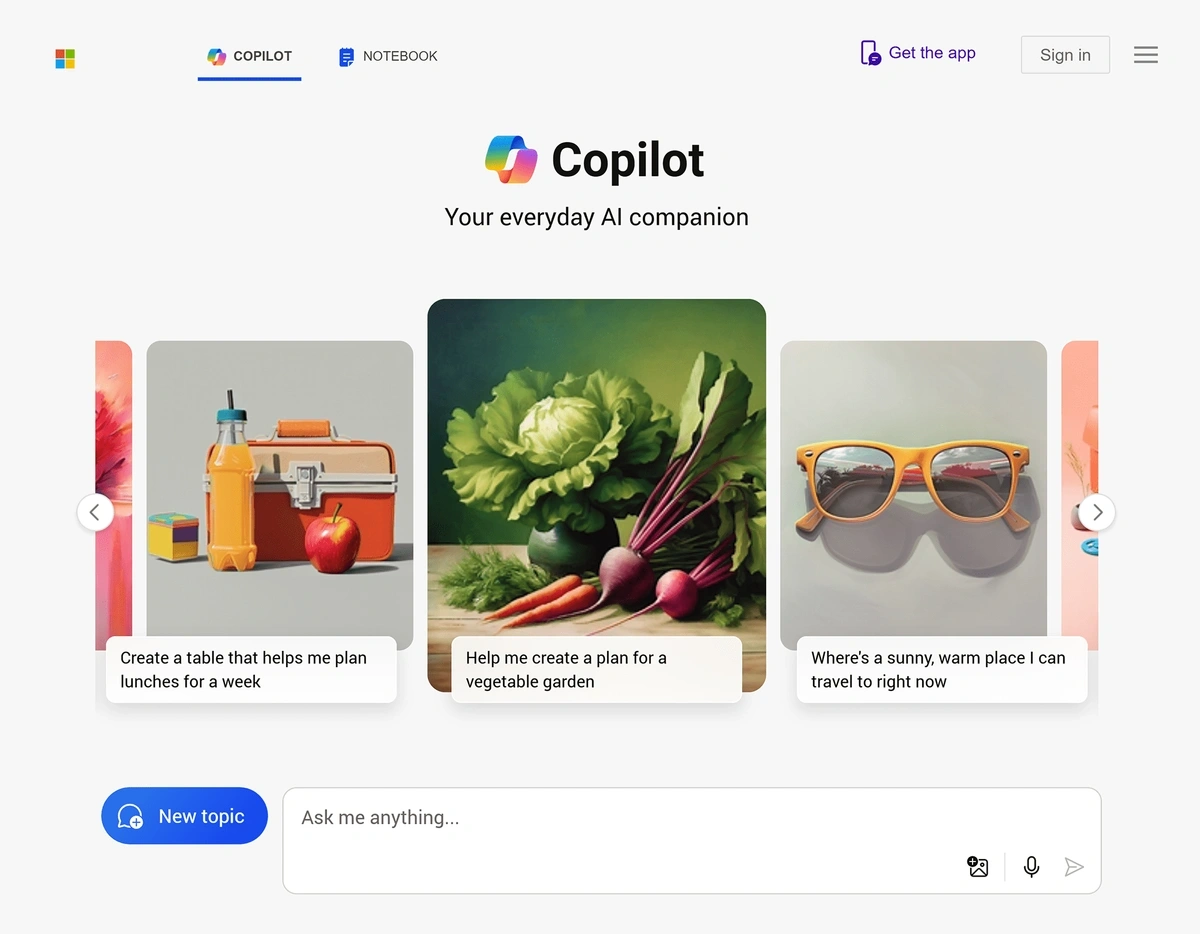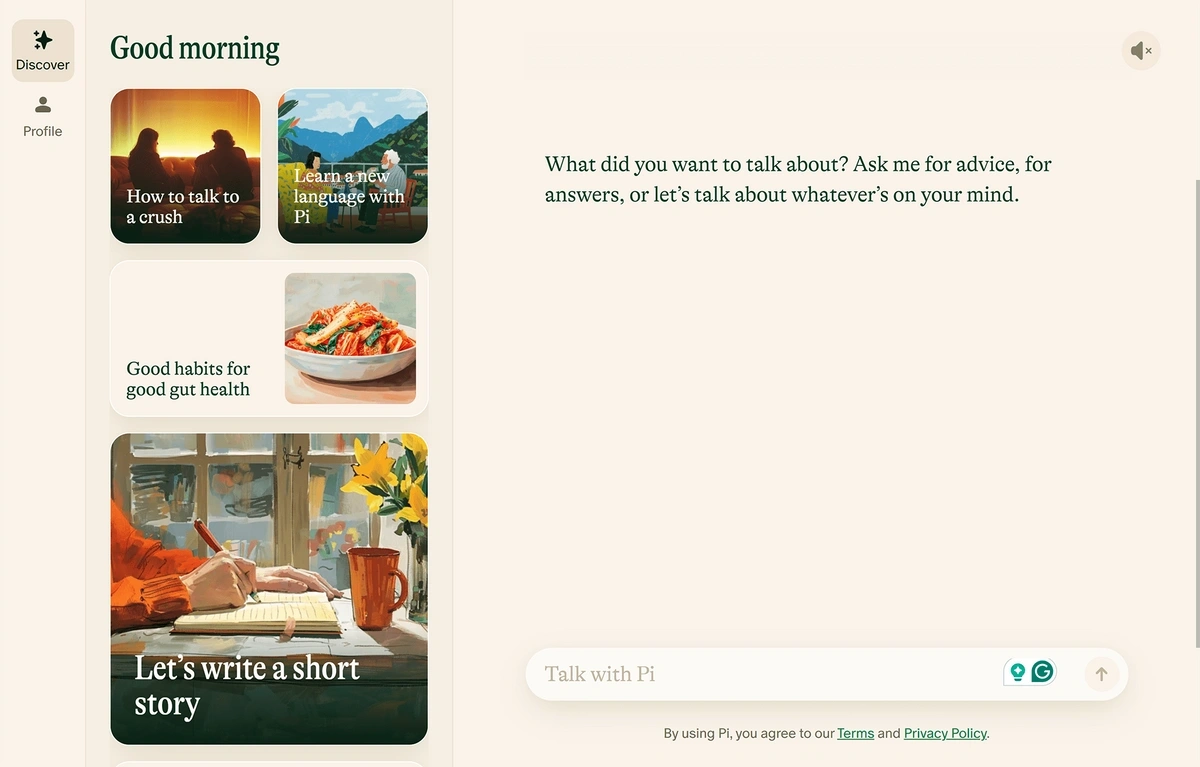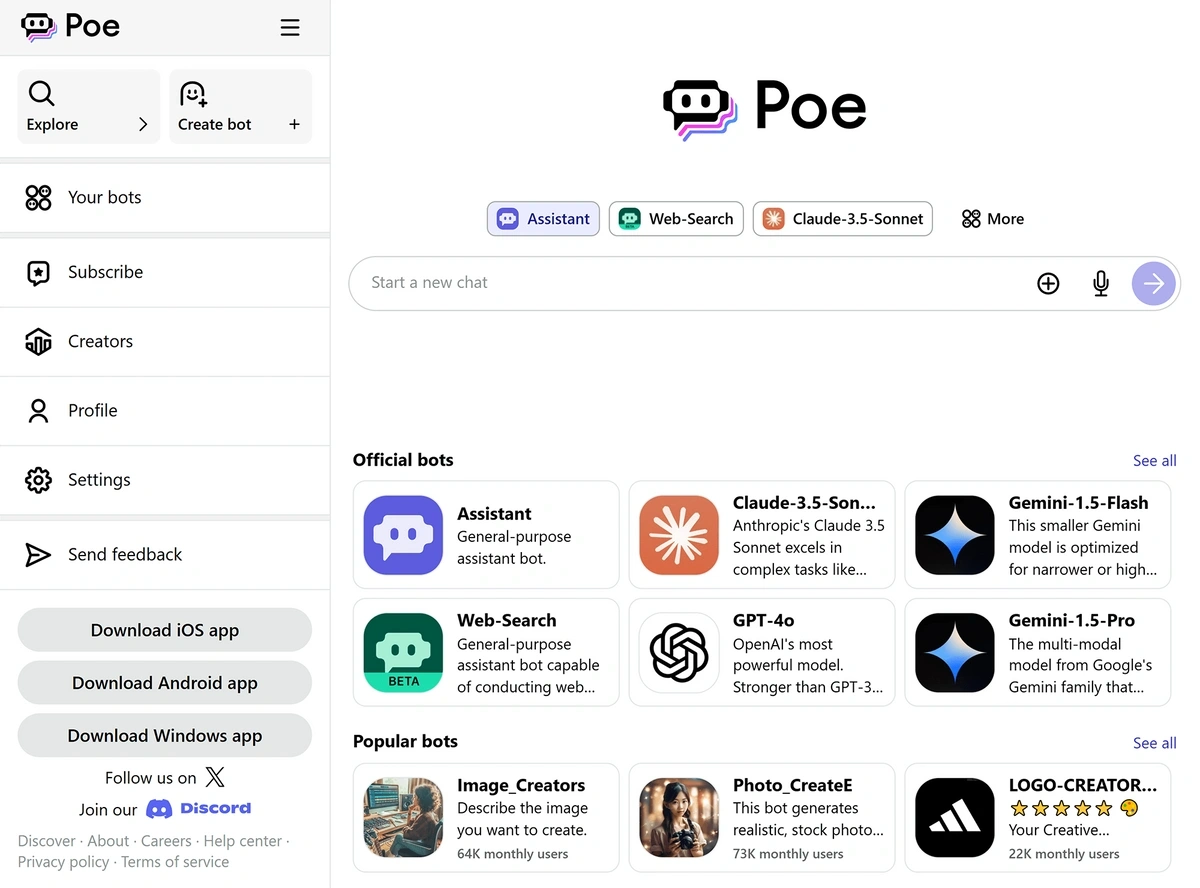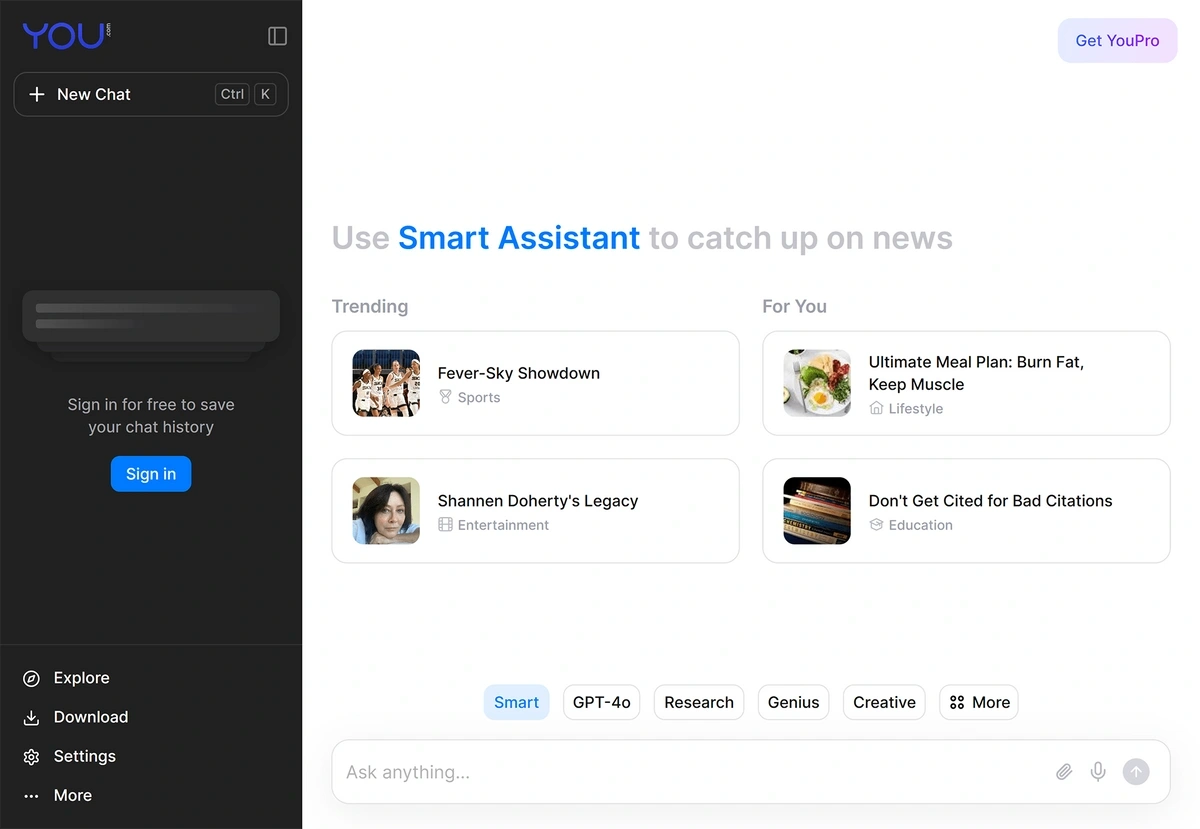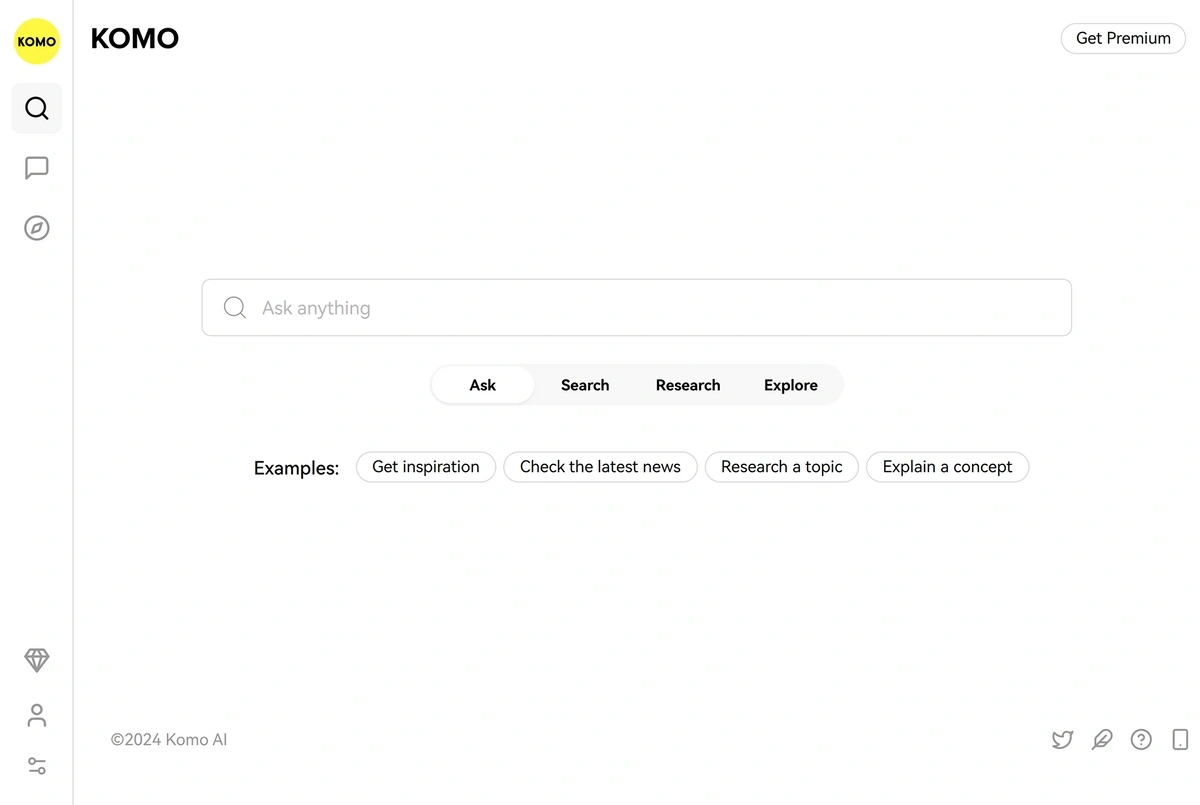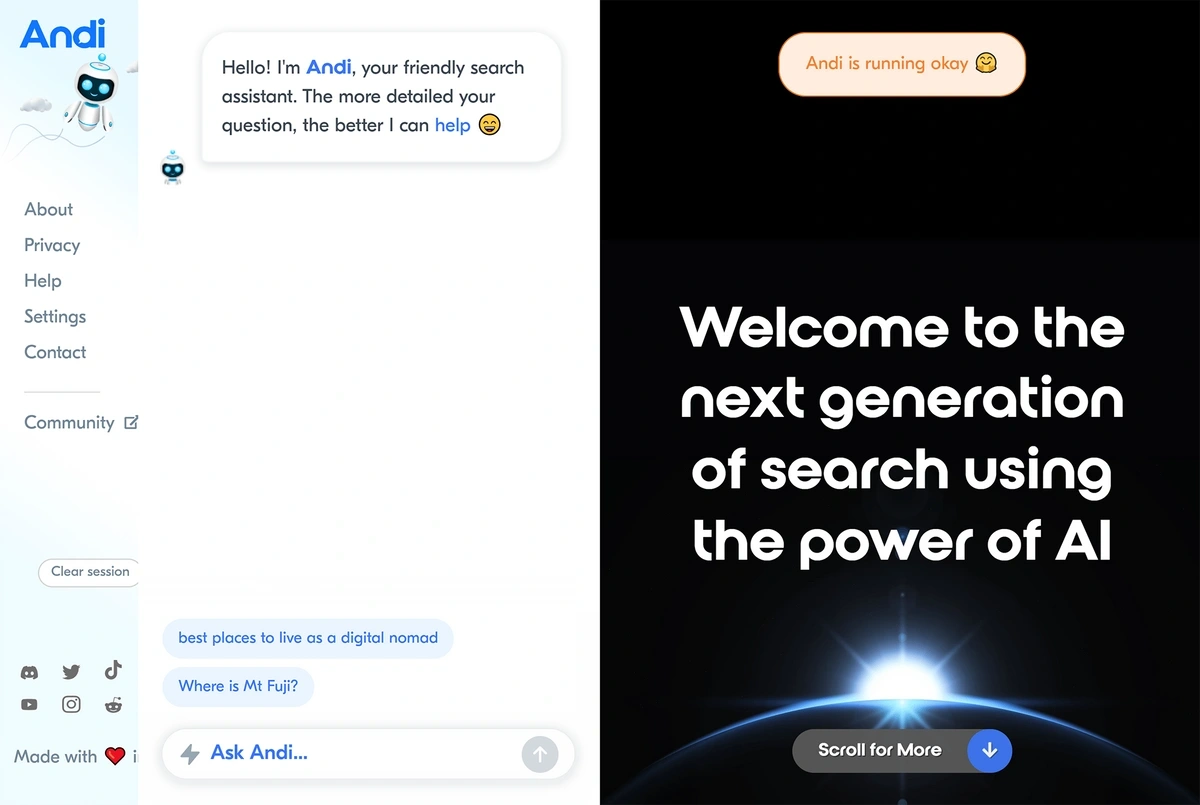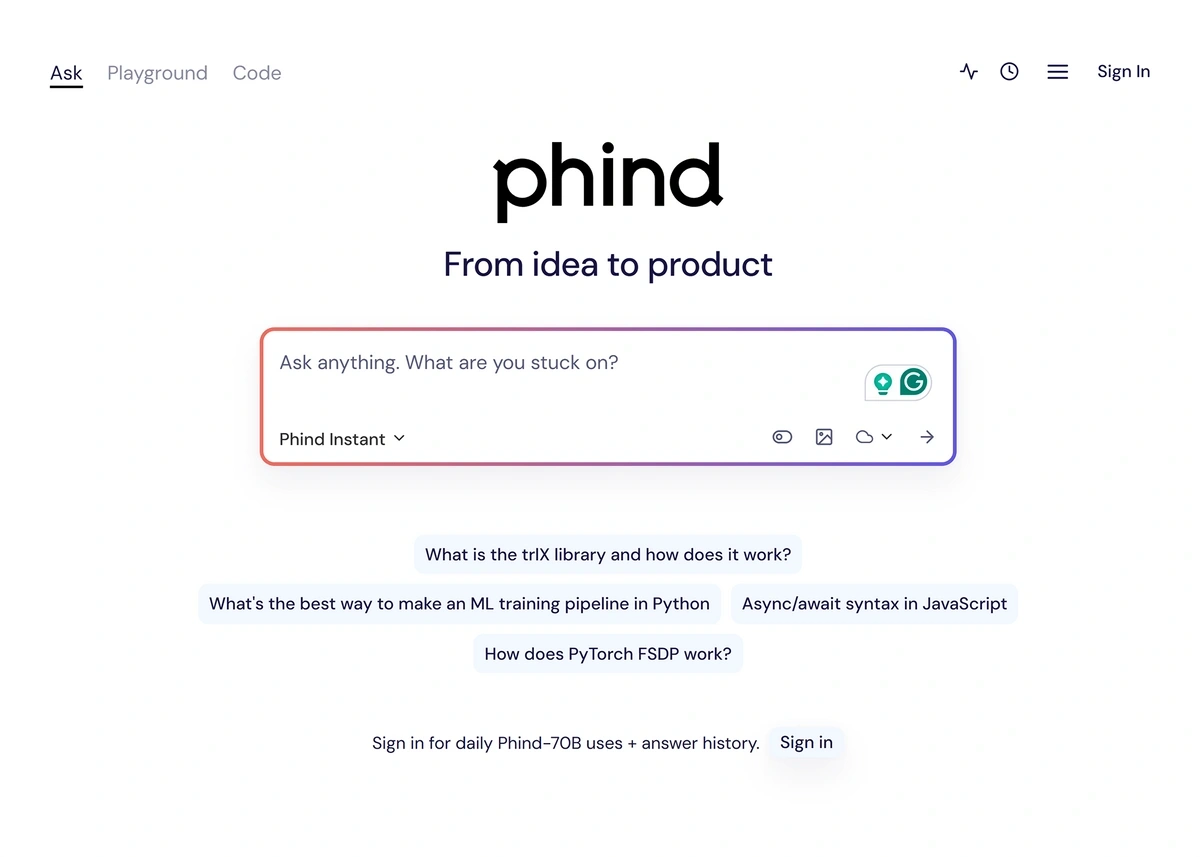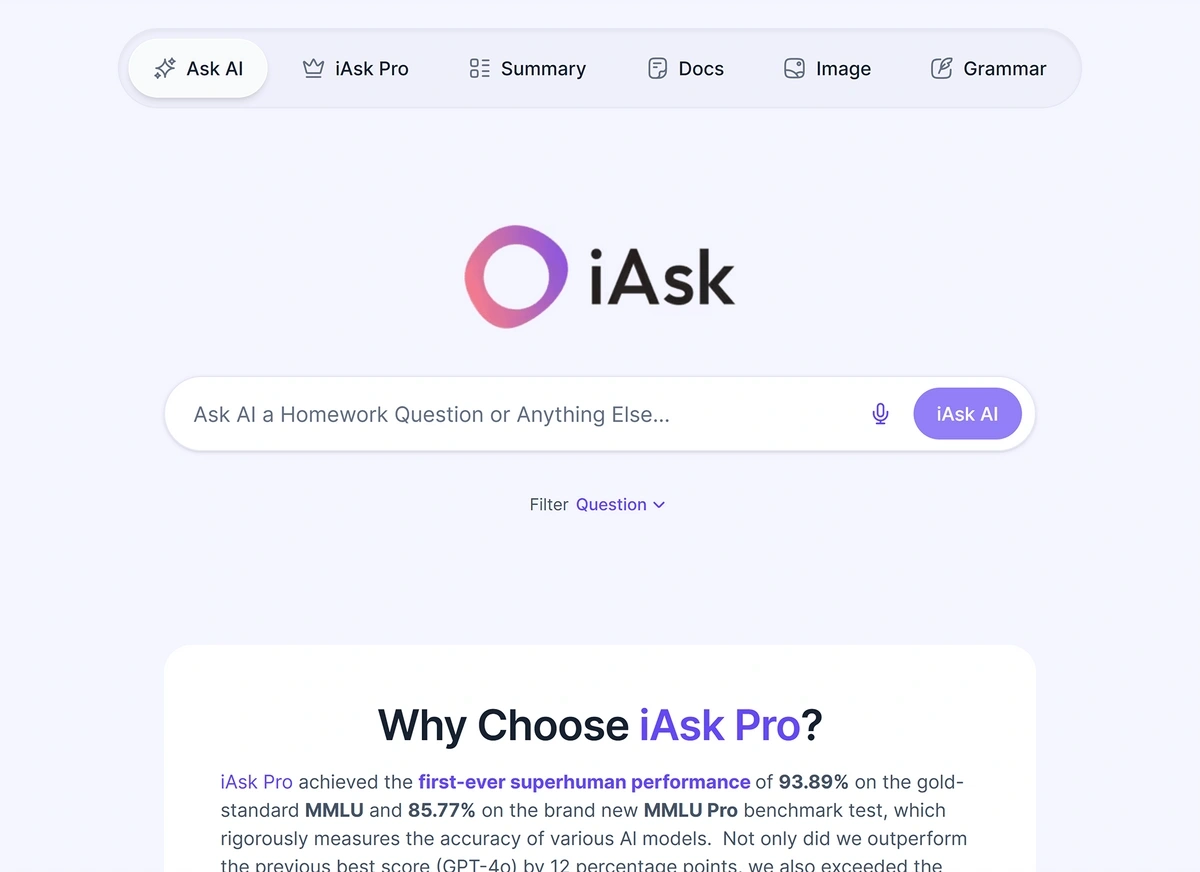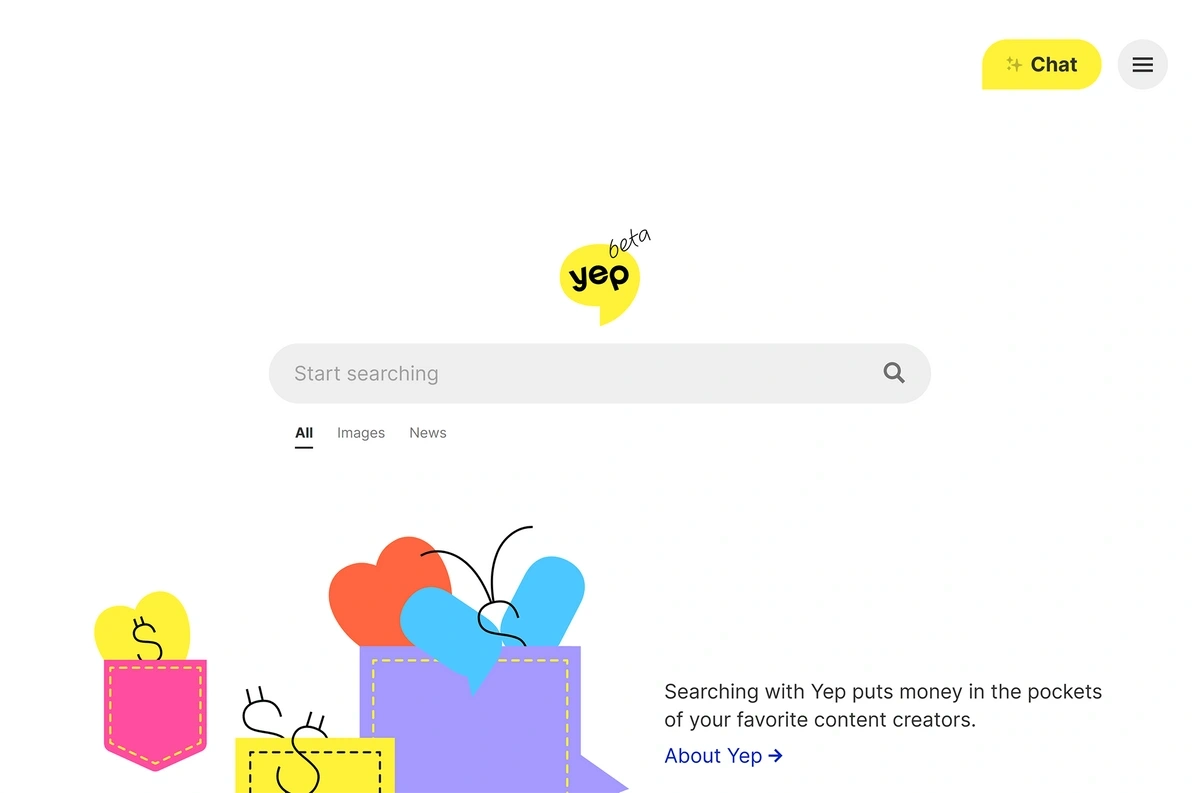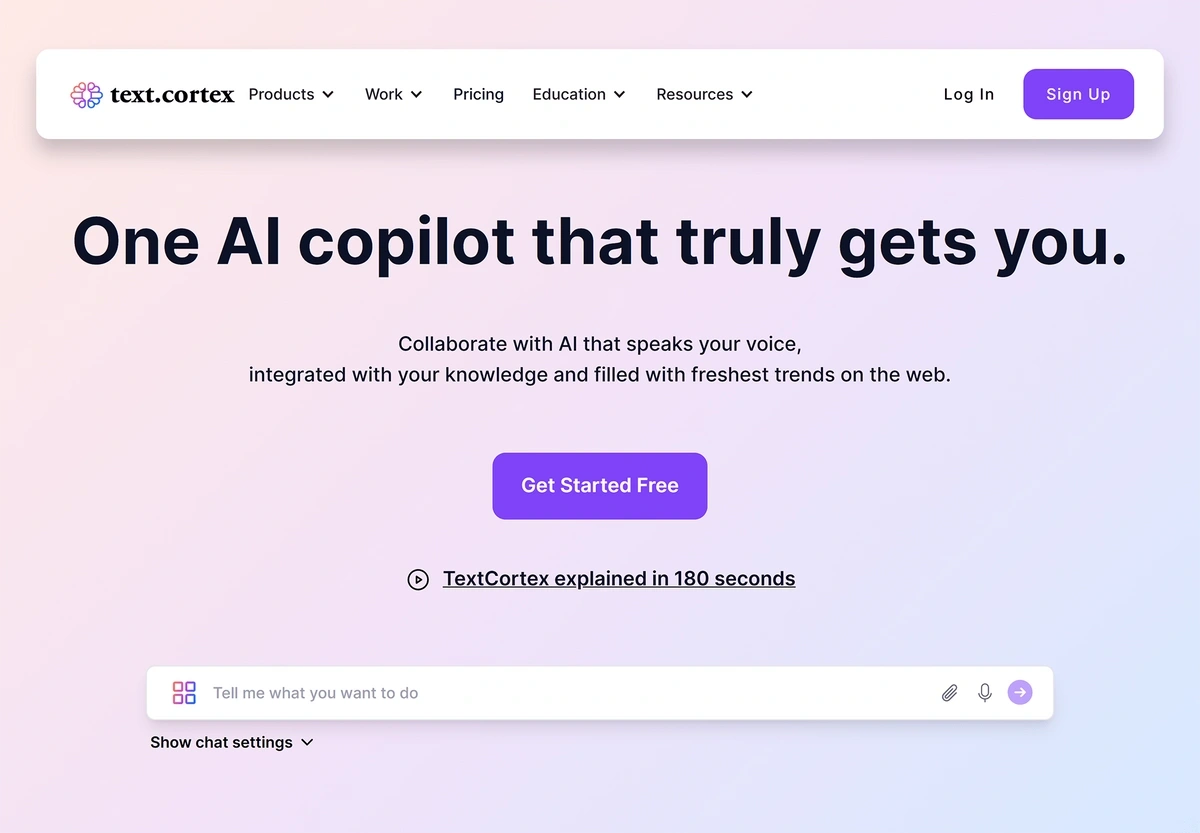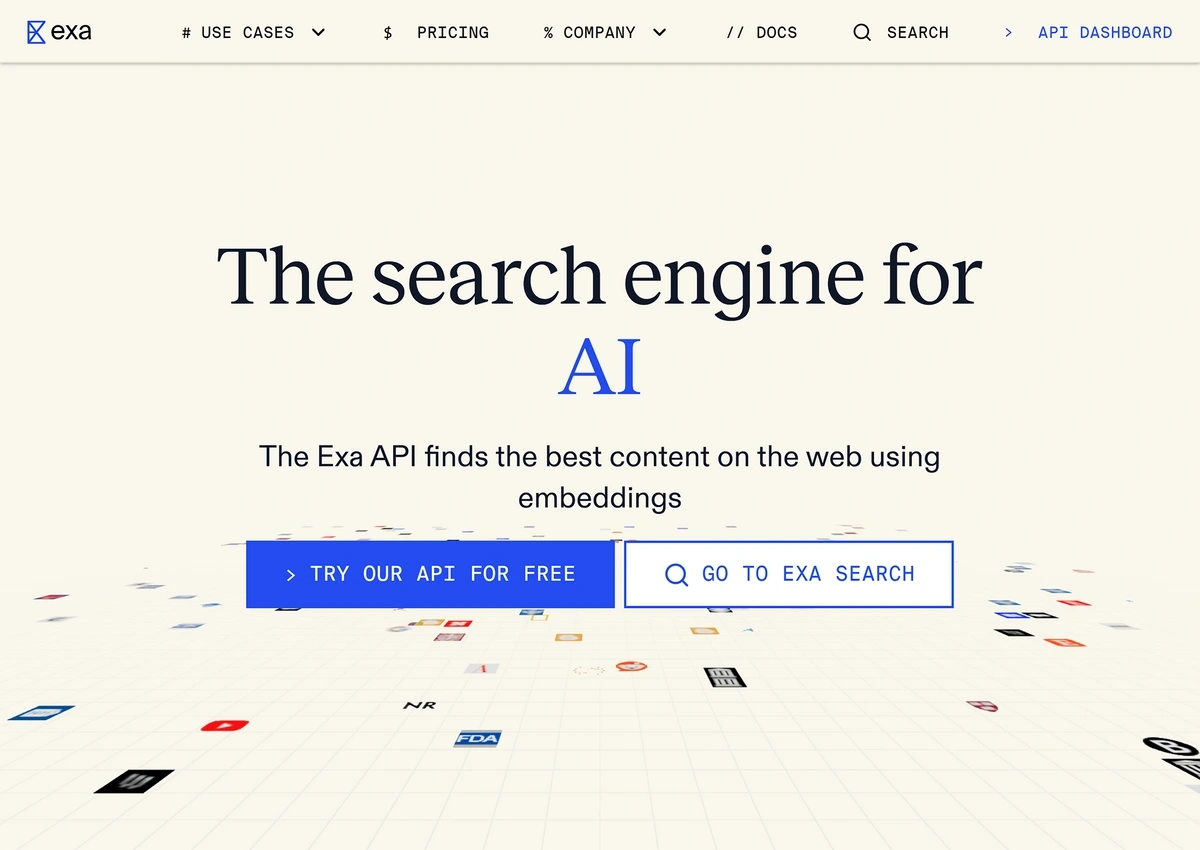Get Advanced Insights on Any Topic
Discover Trends 12+ Months Before Everyone Else
How We Find Trends Before They Take Off
Exploding Topics’ advanced algorithm monitors millions of unstructured data points to spot trends early on.

Features
Keyword Research
Performance Tracking
Competitor Intelligence
Fix Your Site’s SEO Issues in 30 Seconds
Find technical issues blocking search visibility. Get prioritized, actionable fixes in seconds.
Powered by data from
15 Best Perplexity AI Alternatives (2025)
Perplexity AI has quickly become one of the most popular AI tools. But unlike standard chatbots, it functions a bit differently in order to cater to researchers, students, and enterprise users who need real-time information.
Users also have access to extensive features and many of the top AI models. But despite this, it’s not necessarily the best tool for everybody because of its limitations when it comes to content creation and creativity.
Instead, it functions more like a conversational AI search engine for information retrieval.
With that in mind, we’ve compiled a list of the 15 best Perplexity AI alternatives worth considering.
| Platform | Best For | Pricing |
| Brave Leo AI | Increased user privacy and security | $14.99 per month |
| Google Gemini | Integrating AI with Google Suite products | $19.99 per month |
| Claude | Understanding natural human language | Starts at $20 per month |
| ChatGPT | Generating faster, more accurate responses | $20 per month |
| Microsoft Copilot | Real-time access to Internet information | $20 per month |
| Pi | Human-like personal assistant support | Free |
| Poe | Accessing numerous chatbots in one place | $19.99 per month |
| YouChat | Summarizing web pages and documents | $20 per month |
| Komo | Searching niche community conversations | Starts at $8 per month |
| Andi | Concise and to-the-point web searches | Free |
| Phind | Answering technical coding questions and queries | $20 per month |
| iAsk | Finding fast, factual answers | $9.95 per month |
| Yep | Ad-free conversational search results | Free |
| TextCortex | Customizable AI writing assistant with real-time web access | Starts at $5.59 per month |
| Exa | AI web search with API access for complex queries | Starts at $50 per month |
1. Brave Leo AI
Brave Leo AI Overview
Language model: Mixtral 8x7B, Claude Instant, and Llama 2 13B
Connected to the internet: Yes
Purpose: Privacy first AI assistant for web browsing, research, and content creation
Date launched: November 2, 2023
Created by: Brave Software
Brave Leo is an integrated artificial intelligence assistant built directly into the Brave web browser. It’s like the privacy-focused version of Perplexity AI because users can choose between various LLMs (Mixtral 8x7B, Claude Instant, and Llama 2 13B) to perform multimodal tasks like text, image, audio, or video content processing.
Brave's entire business model as a web browser is built on privacy. The same is true for Leo AI. The tool does not retain chats and no user information is ever used for model training or user identification.
However, Leo is only available for Brave browser users. It’s deeply integrated and gives users direct access to Leo’s features from the address bar or sidebar while visiting a web page to analyze text, ask for a translation, or get quick answers to content-related questions.
Brave Leo AI Pros and Cons
Pros
- Does not record chats to maintain user privacy and security
- Quickly summarizes web pages, PDFs, Google Docs, and other documents without leaving the page
- Can create new content, including articles, essays, emails, and code suggestions
- Available for both text and voice-to-text interactions
Cons
- Not nearly as advanced in continuous learning and natural language comprehension as other AI assistants
Brave Leo AI Pricing
Leo is free forever for all Brave browser users. However, usage limits apply, and you may see slower response times during peak usage hours. Leo Premium is available with an initial 7-day free trial and $14.99 per month. Premium members can switch between LLMs with higher rate limits.
2. Gemini
Gemini Overview
Language model: Proprietary family of Gemini models (Ultra, Pro, Flash, and Nano)
Connected to the internet: Yes
Purpose: AI-powered Google Suite assistant for research and content creation
Date launched: March 21, 2023
Created by: Google DeepMind
Google's Gemini is the refined and rebranded update to Bard. Google’s AI model and chatbot was developed as an alternative to compete with ChatGPT.
However, it operates a lot like Perplexity AI because of its multimodal capabilities and real-time search functionality through Google’s search engine.
Despite the improvements to Gemini, it still produces more hallucinations than Perplexity. But for creating content, it surpasses Perplexity with human-like content and a customizable writing style that Perplexity has yet to reach.
The model’s latest release, Gemini 1.5 Pro, offers a massive 1,000,000 token context length, while Perplexity is more limited to around 30,000 tokens.
Gemini Pros and Cons
Pros
- Integrates with Google search to access real-time information.
- Provides instant and accurate translations across 35 different languages.
- Multimodal capabilities for processing text, images, audio, and video.
- Known for its advanced reasoning and complex problem-solving capabilities.
Cons
- Users need a Google account to sign up.
- Lacks creativity in content creation that other alternatives can provide.
Gemini Pricing
Gemini is free for all users, but an upgrade is required to unlock Gemini Advanced. For $19.99/month, you can create a Google One account to get full Gemini Advanced access, 2TB of cloud storage, and other benefits like Gemini, available directly in Gmail, Docs, and other Google apps.
3. Claude
Claude Overview
Language model: Proprietary (Claude 3 Haiku, Sonnet, and Opus)
Connected to the internet: No
Purpose: Advanced natural language chatbot assistant
Date launched: March 2023
Created by: Anthropic
For those who prefer a more versatile alternative to Perplexity, Claude is a solid choice because of the tool's advanced reasoning capabilities and a strong focus on AI safety. Claude is also a more creative chatbot for content creation with a large context window of up to 100,000 tokens.
While Claude is not connected to the internet because of Anthropic’s focus on AI safety, it's trained on the most recent data (with a cutoff date of March 2025). This makes Claude less valuable for research purposes, but it’s preferred for creative tasks because of the tool’s grasp of context and nuance.
In May 2025, Anthropic released Claude Opus 4.
Claude Pros and Cons
Pros
- Emphasizes AI safety to provide users with helpful, harmless, and honest information
- Access to the full suite of Claude models, including Claude Opus 4
- Provides the best understanding of natural language, primarily in technical domains
Cons
- No internet connection to pull real-time information
Claude Pricing
A limited version of Claude is free for users who want basic access to the tool through the web or iOS app. This also grants access to Claude 3 Sonnet. However, to unlock more features like Claude 3 Opus and Haiku, higher usage limits, project creation, and early access to new features, a Pro ($20 per month) or Team ($30 per month) membership is required.
4. ChatGPT
ChatGPT Overview
Language model: GPT‑4o, GPT-4, GPT-3.5
Connected to the internet: Yes
Purpose: Conversational AI assistant for advanced tasks and content generation
Date launched: November 30, 2022
Created by: OpenAI
Search engine-reliant tools like Gemini and Perplexity AI are great for research but need to improve in other areas, like advanced language understanding and generative AI content creation. That’s where ChatGPT, the most popular AI tool in the space, comes in handy.
With this versatile AI chatbot, it's also easier to start and hold longer human-like conversations. Users have a 128,000 token context window for text inputs while getting new access to improved multilingual, audio, and vision capabilities.
A ChatGPT subscription allows users to switch between the GPT‑4o, GPT-4, and GPT-3.5 models. However, you'll need a Plus membership to unlock real-time information retrieval and web browsing with ChatGPT. Otherwise, the tool falls well short of Perplexity AI when it comes to web research.
ChatGPT Pros and Cons
Pros
- Trained on a large knowledge base between 570 GB and 45 TB of text
- Ability to create and use Custom GPTs from the GPT store
- Supports over 50 languages for content creation and translations
- Available as a mobile app and browser extension for easy access
Cons
- Free users can only access an outdated knowledge base with no real-time web browsing
ChatGPT Pricing
ChatGPT is free forever for basic users. This tier includes full GPT-3.5 access and limited GPT-4 and GPT-4o access. During peak usage times, free users will experience slower response times.
Meanwhile, Pro users unlock full access to all GPT models with 5x the GPT-4o capacity for only $20 per month. ChatGPT Team is $30 per user each month with higher messaging limits and admin console access if you work with other team members.
5. Microsoft Copilot
Microsoft Copilot Overview
Language model: GPT-4o, GPT-4, GPT-4 Turbo
Connected to the internet: Yes
Purpose: AI-driven productivity assistant for Microsoft users
Date launched: February 22, 2023
Created by: Microsoft
Much like Perplexity, Microsoft Copilot caters to researchers who want information with citations and references. Copilot is also completely free to use and easily integrates with Microsoft 365 applications and services like Word, Excel, PowerPoint, Outlook, and Teams.
Formerly known as Bing Chat, Copilot can access real-time information through Bing search results. With each query, Copilot includes sources for claims, accurate data, and statistics (when relevant).
Despite the advanced content generation capabilities, Copilot really stands out in enhancing users’ workplace productivity and creativity. The enterprise features are currently more equipped to help larger organizations collaborate, too.
Microsoft Copilot Pros and Cons
Pros
- Makes it easy to automate repetitive tasks like drafting emails and generating reports
- Integrates with Microsoft 365 (Word, Excel, PowerPoint, Outlook, and Teams) to optimize workflow
- Query responses include citations with direct links to sources
- Provides context-aware suggestions with continuous learning
Cons
- More prone to hallucinations than other alternatives with direct internet access
Microsoft Copilot Pricing
Microsoft Copilot is free to use in a web browser, but upgrading to Copilot Pro unlocks added features. For $20 per user per month, Copilot Pro offers access to Copilot in Microsoft 365 apps like Word, Excel, PowerPoint, Outlook, and OneNote.
You unlock extra features like image creation with Designer and priority access to GPT-4 Turbo. Copilot is available for commercial customers at $30 per user per month. The increased pricing includes added enterprise-grade security, privacy, and compliance.
6. Pi
Pi Overview
Language model: Inflection-1
Connected to the internet: Yes
Purpose: Personalized AI companion for emotional support and conversation
Date launched: May 2, 2023
Created by: Inflection AI
Developed by Inflection AI, Pi is a personal AI chatbot assistant capable of providing personal and genuine responses during conversations. It combines factual information with emotional intelligence to make it feel like a more personalized AI tool.
Pi is more than a typical chatbot and qualifies itself as a neutral interlocutor AI agent that uses continual learning to improve a user's experience. All conversations with Pi are natural and meaningful, skipping over the generic responses many tools are prone to providing.
Since Pi integrates real-time web search capabilities, it can offer similar features as Perplexity. But because Pi focuses more on empathetic and supportive interactions, it’s best to view it as more of a creative partner or coach rather than a thorough research tool like Perplexity AI.
Pi Pros and Cons
Pros
- Completely free to use with no limit restrictions
- Provides empathetic responses and displays human-like emotional support
- Adapts to an individual user's conversational style
- Uses previous chats to provide personalized query responses
Cons
- Limited knowledge base and lacks advanced content creation capabilities
Pi Pricing
Pi is still considered to be in the initial launch phase, so Inflection has made the tool completely free to use. Currently, no premium pricing plans or upgrades are available, but that could change as Pi and Inflection AI evolve.
7. Poe
Poe Overview
Language model: Claude 3.5, Gemini 1.5, GPT-4o, etc.
Connected to the internet: Yes
Purpose: To democratize AI and give users access to the widest range of chatbots
Date launched: February 6, 2023
Created by: Quora
Poe (Platform for Open Exploration) is an AI chatbot platform developed by Quora. Like Perplexity, users can choose the popular AI models they want to use (ChatGPT, GPT-4o, Claude 3 Opus, etc.) and even create custom chatbots on the platform.
Its primary function is to aggregate multiple AI models. While Perplexity offers a similar capability, Poe is built for more general AI interactions, such as casual conversations, basic problem-solving, and content creation.
Quora is planning to make the platform a place where creators can thrive, too. The Creator Monetization program allows you to create and launch a chatbot on Poe and get paid per subscriber and per message.
Poe Pros and Cons
Pros
- Offers numerous AI models like GPT-4, Claude, PaLM, and more in one platform
- Custom chatbot creation without coding
- Does not show ads or track previous user search history of clicks
- Connects to the internet and provides up-to-date information
Cons
- Limited messaging for free users
- Higher rate of false information and hallucinations
Poe Pricing
Poe is free to use forever for customers who only need basic functionality, low daily messaging limits, and a limited selection of AI bots and models. You can upgrade to a premium plan for $19.99 per month or $199.99 per year to unlock all models and chatbots, increase daily limits, and gain priority access and support.
8. YouChat
YouChat Overview
Language model: Proprietary in-house model and other existing LLMs
Connected to the internet: Yes
Purpose: AI-driven content creation and web search assistant
Date launched: December 2023, 2022
Created by: You.com
Like Perplexity AI, YouChat is a ChatGPT-style search engine with conversational AI capabilities and real-time web access. It also directly integrates with You.com's AI-powered content creation tools suite, such as YouWrite, YouImagine, and Code Complete.
Users can also switch between different modes (Smart, GPT-4o, Research, Creative, etc.) to determine the type of output they'll generate. Plus, the platform has an Explore page to see the latest news, generate AI summaries of published articles, and ask follow-up questions about the topic.
Some of the research YouChat provides needs to catch up to the depth Perplexity can offer, but pairing YouChat with their other tools can really improve productivity and creativity.
YouChat Pros and Cons
Pros
- Uses Google search to provide sources and citations with generated answers
- Real-time learning capabilities
- Provides up-to-date information
- Protects user information and never shares customer data
Cons
- Subscription required to access most advanced AI models
- Research can be clunky with too many contradicting sources or citations
YouChat Pricing
YouChat is free to use, but YouPro provides more features, such as full access to premium AI models (GPT-4o, Claude 3 Opus, etc.), unlimited queries, and greater accuracy. Users can upgrade for $20 per month (or $180 billed annually).
9. Komo
Komo Overview
Language model: Sunshine (Komo's proprietary LLM)
Connected to the internet: Yes
Purpose: Personalized AI search with added privacy and community insights
Date launched: August 29, 2022
Created by: Komo
Komo is a free AI search engine that offers a private, fast, and ad-free search experience. Users can easily search the web, see the latest news, and generate content. Like Perplexity, you can also perform deep dive searches on specific topics by adjusting the search type and asking follow-up questions.
Students and academics conducting research, businesses looking for data-driven insights, and anyone needing efficient information retrieval will find Komo's search function to be highly advanced with added privacy features.
Users can refine the responses they'll receive from a query by selecting from the Ask, Search, Research, and Explore tabs. It’s completely free to use to start.
Komo Pros and Cons
Pros
- Provides quick, accurate, and relevant search results
- Able to summarize and bookmark web content
- Explore feature scans social media to see what the community says about a topic
- Can be used for content creation, translation, summarization, and question
Cons
- The user interface is clunky for new customers
Komo Pricing
While Komo is free to use, it has many limitations. Upgrading to a paid plan is preferred for extensive use. The Basic pricing plan starts at $8 per month, which includes unlimited search with Komo’s proprietary ‘Sunshine’ model and up to 30 research mode queries per day.
More active users will benefit from the $15 per month Premium plan. This tier includes up to 300 daily research mode queries and centralized access to GPT-4, Claude, and Gemini models.
10. Andi
Andi Overview
Language model: Proprietary
Connected to the internet: Yes
Purpose: Generate quick topic-related web summaries from search engine sources
Date launched: December 2021
Created by: LazyWeb Inc.
Andi is a search engine that combines generative AI, live data integration, and semantic search technology to create a conversational search experience. After submitting a question or query, Andi generates a list of links to web pages that contain related information.
The more visual, card-style interface is less in-depth but more user-friendly than Perplexity. From there, users can visit the page, quickly read about the topic, or ask Andi to summarize and explain it. If you don’t like the results, try refining the search to generate results from DuckDuckGo or Brave instead.
There are plenty of ways to dial in the search results to go deep into a specific topic. Andi also maintains user privacy well by eliminating ads and not tracking user search history or clicks. Right away, users will notice a huge difference in user experience compared to Perplexity AI.
Andi Pros and Cons
Pros
- Provides direct links to sources from Google, DuckDuckGo, etc. with AI summaries
- Offers a completely ad-free search experience
- Provides up-to-date and context-aware responses
Cons
- Lacks advanced features and content generation capabilities
- Limited personalization
Andi Pricing
Right now, all Andi features are completely free. There are no premium membership tiers available.
11. Phind
Phind Overview
Language model: Proprietary Phind models (Instant and 70B)
Connected to the internet: Yes
Purpose: Offer quick answers and code suggestions to developers and programmers
Date launched: February 21, 2023
Created by: Phind
Phind is an AI answer engine built for developers and programmers. The tool is primarily used to solve challenging programming problems by generating query answers, code examples, and responses with generative AI.
Users can choose from a list of AI models they want to use when generating query or question responses (Phind Instant, Phind-70B, GPT-4o, Claude 3.5 Sonnet, etc.). It’s specialized for programming, with developer environment integrations and a 32k token context window to support longer, more detailed conversations.
If you’re a developer who needs somewhere to go to get quick answers, Phind offers a little more than Perplexity AI can. This includes a Playground feature similar to OpenAI’s Playground to test different models and Code Mode, a side-by-side coding chatbot.
Phind Pros and Cons
Pros
- Provides accurate and contextual programming question responses
- Can handle advanced coding tasks like running Python snippets in your browser
- Provides sources with links for all coding suggestions and answer replies
Cons
- Not useful for more general searches or research outside of coding
Phind Pricing
Phind is free to use but with limitations. Phind Pro is available for $20 per month and includes unlimited Phind-70B searches, multi-query search mode, an extended 32k context window, and more access to advanced AI models like Claude and GPT-4o.
12. iAsk
iAsk Overview
Language model: Property (iAsk Pro)
Connected to the internet: Yes
Purpose: To generate fast AI responses to natural language queries
Date launched: January 1, 2022
Created by: Ai Search Inc.
iAsk is a free AI search engine that allows users to use natural language to generate instant, accurate, and factual answers to their questions. It's built on a fine-tuned large-scale Transformer language-based model that outperformed all current LLM models.
iAsk acts more like a traditional search engine like Microsoft Copilot, while Perplexity is more reliable for chat-based information retrieval and research. However, iAsk does allow users to adjust their desired query response length and filter sources by category (Question, Academic, Wiki, etc.).
Premium users unlock a suite of features that make iAsk even more impressive. These include the ability to ask follow-up questions, document uploading, image generation, and more.
iAsk Pros and Cons
Pros
- Pro model ranks as the best among all available LLMs according to benchmarks
- Offers additional content summarization and image creation features
- Versatile tool for research with real-time web search access
Cons
- May struggle with complex queries or nuanced contexts
iAsk Pricing
While iAsk is free to use, this tier includes ads and no access to Pro questions. To unlock more features, you’ll need to upgrade to iAsk Pro. This tier is available for $9.95 per month and includes 300 daily Pro questions, Advanced Self-Reasoning AI capabilities, no ads, and much more.
13. Yep
Yep Overview
Language model: Proprietary
Connected to the internet: Yes
Purpose: Google alternative with built-in AI chatbot capabilities for quick responses
Date launched: June 2022
Created by: Ahrefs
Yep is a privacy-focused, revenue-sharing search engine developed by Ahrefs. The search engine itself functions a lot like Google, but it has limited AI features. But built into the platform is Yep Chat, a conversational AI assistant that can understand text prompts and generate replies with real-time web information.
Ahrefs has incorporated content and link signals, as well as NLP and BERT models, to create Yep. This allows the search engine to produce relevant and helpful search results for users with continuous updates and indexing.
Yep has also created an ad revenue-sharing model for content creators. For more in-depth research, Perplexity wins. However, for users who want a more diverse search experience, Yep can offer something different.
Yep Pros and Cons
Pros
- Emphasizes privacy by not collecting any user personal information
- Offers a 90% ad revenue share program to reward content creators
- Indexes search results every 15-30 minutes to offer the most up-to-date information
- Yep Chat can scan the web for research and content creation
Cons
- Limited generative AI content capabilities while Yep Chat is in beta
- Search results quality lags behind other competitors, especially for news queries
Yep Pricing
Since Yep is mainly still in beta, it's completely free to use with no monthly memberships available.
14. TextCortex
TextCortex Overview
Language model: Zeno (Proprietary)
Connected to the internet: Yes
Purpose: Generative AI copilot for internet browsing, research, and content creation
Date launched: July 2021
Created by: Text Cortex AI
TextCortex is an AI-powered writing assistant with various features, such as ZenoChat, Zeno Assist, and the TextCortex Toolbar, to help with content creation, web research, and more. With so many different features, TextCortex operates like a true AI copilot that integrates seamlessly into your workflow.
Creativity is a strong point for TextCortex as it allows users to create new personas for content generation. This feature tailors content to match brand voice or writing style by generating output based on a preset tone of voice.
With access to real-time web browsing and knowledge collaboration, users can connect multiple data sources like Google Drive or Microsoft OneDrive. For larger teams who rely on AI to perform research and create SEO-optimized content, TextCortex is a better option than Perplexity AI.
TextCortex Pros and Cons
Pros
- Produces high-quality, SEO-optimized content from customizable prompts
- Supports over 25 languages for content writing
- Allows users to create personalized personas for more creative content generation
- Available as a browser extension to connect with popular apps like Google Docs
Cons
- Pricing can be steep for high-use individuals compared to alternative options
TextCortex Pricing
For all of its advanced content generation features, TextCortex is quite affordable and even offers a limited free plan with 20 daily creations included. For more access, premium plans start as low as $5.59/month per 150 creations.
The most popular premium plan is $23.99 monthly, including 1,000 creations and 300 MB of storage. Custom plans are available for enterprise users.
15. Exa
Exa Overview
Language model: Proprietary
Connected to the internet: Yes
Purpose: Precise AI research assistant with real-time information and data
Date launched: January 2021
Created by: Exa AI
Similar to Perplexity AI, Exa is an advanced AI-powered search engine that can understand user intent and deliver contextually relevant search results. Primarily, Exa is used for retrieval-augmented generation (RAG), deep research, and training datasets.
Because Exa can conduct complex, research-based searches and find highly relevant resources based on user queries, it has been described as the “AI Librarian for the Web.”
The company's AI model is a novel link prediction transformer that goes beyond standard keyword matching like Google does with SEO content.
Users can filter searches based on content category (company, blog post, news, etc.) and publish date to retrieve more refined results. They also offer an API for companies and developers to integrate live web data into their AI applications.
Exa Pros and Cons
Pros
- Easily interprets and breaks down complex queries to generate precise results
- Offers interactive, live chat capabilities where users can ask follow-up questions
- Provides access to the latest information from the web to avoid hallucinations
- API access for businesses and developers
Cons
- Lacks content creation and creative writing capabilities
- Information accuracy is a step behind Perplexity AI
Exa Pricing
Free users get up to 10 results per search and 1,000 total monthly requests for the Exa search engine. As you use the tool more, upgrades are required to match desired search amounts. For a minimum spend of $50/month, users get up to 25 results per search and pay $10 per 1,000 searches.
If 25 search results are not enough, you can upgrade and get up to 100 results per search. But be prepared to spend a minimum of $250 per month, $10 per 1,000 searches (1-25 results), and $30 per 1,000 searches (26-100 results).
Conclusion
That wraps up our list of the top-rated Perplexity AI alternatives.
Unlike standard AI chatbots or assistants, Perplexity is an AI search engine geared more towards in-depth internet research. With this niche market of AI tools continuing to grow rapidly, you’ll notice that each of these Perplexity AI alternatives has something unique to offer that could suit you well.
Stop Guessing, Start Growing 🚀
Use real-time topic data to create content that resonates and brings results.
Exploding Topics is owned by Semrush. Our mission is to provide accurate data and expert insights on emerging trends. Unless otherwise noted, this page’s content was written by either an employee or a paid contractor of Semrush Inc.
Share
Newsletter Signup
By clicking “Subscribe” you agree to Semrush Privacy Policy and consent to Semrush using your contact data for newsletter purposes
Written By


Anthony is a Content Writer at Exploding Topics. Before joining the team, Anthony spent over four years managing content strat... Read more




